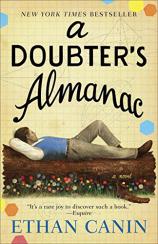A Doubter's Almanac
Review
A Doubter's Almanac
In a recent post on the website Medium, mathematics PhD Junaid Mubeen complained that a mere five years after he obtained his doctorate, he no longer understood his dissertation, a painful discovery that led him to question the value of advanced mathematics study. To assuage his self-doubt, Mubeen quickly offered several justifications to support his belief in the worth of contemplating higher mathematics for its own sake. The final one --- that "in its purest form, mathematics is the perfect expression of human thought that marries logic with creative expression" --- might serve as an apt description of the brilliant, infuriating protagonist of A DOUBTER'S ALMANAC, Ethan Canin's elegant fifth novel (and first since 2008's equally ambitious, but flawed, AMERICA AMERICA).
At an early age in his home town of Cheboygan, Michigan, Milo Andret discovers his preternatural ability to "picture the world, all of its six directions, his exact place any three- dimensional topography." His path from a modest upbringing to the highest echelon of the mathematics world is anything but conventional, as he parlays a Berkeley PhD in topology (the field of mathematics concerned with the properties that are preserved through deformations, twistings and stretchings of objects) into an endowed chair at Princeton and receipt of the Fields Medal, mathematics' equivalent of the Nobel Prize, all by age 40, solving the Malosz conjecture (a fictional problem like others Canin cleverly invents) that has bedeviled his field for years.
"Ethan Canin understands both the allure of great intellectual accomplishment and the price it exacts from those who pursue it. Unlike his protagonist, his own prodigious effort has produced a work of exquisite and enduring beauty."
But Milo's rare intelligence is equaled by his talent for self-destruction, a personality flaw that manifests itself in alcoholism and an affair with a colleague's wife that ends disastrously and sends him tumbling down the career ladder, until he lands at a small and undistinguished Baptist women's college in Ohio. Eventually, he forsakes his family to take up residence in a dilapidated cabin in rural central Michigan, his personal life and academic career in shambles.
Though it only becomes clear about one-third of the way through the novel, as the narrative shifts from third person to first, we see Milo's story through the eyes of his son, Hans, whose middle name, Euler, invokes the memory of the 18th-century German mathematician whose Seven Bridges of Königsberg problem was one of the first in modern topology. Hans shares his father's mathematical talent, but abandons his pursuit of a doctorate for a job on Wall Street in the 1990s. There, he develops complex derivative trading algorithms, the fuel Wall Street poured on the fire of the housing crisis that nearly brought down the world financial system in 2008, in a job that calls upon him to display "laserlike concentration, knifelike thought and hoglike greed." Unfortunately, Hans shares not only his father's rare talent but also his prodigious appetite for mind-altering substances, in his case drugs rather than alcohol.
The second section of the novel is the heartbreaking story of Milo's life in obscurity, in which "his misshapen intellect had narrowed the world to a deadened, claustrophobic slit." For all Milo's self-inflicted punishment and the cruelty he displays in driving away his patient wife and gifted children, Canin unobtrusively evokes our sympathy for a character whose self-absorbed behavior undermines it at every turn. Hans describes his parents' marriage as a "particularly despairing seesaw, at one end of which Dad had stacked every ounce of his logical brilliance, his highly purified arrogance, his Olympian drinking, his caustic derision, his near-autistic introversion, and his world-class self-involvement, and at the other end of which my mother had placed her two modest parcels of optimism and care." But as Milo approaches the end of his life, the return of his now ex-wife, one of his former lovers and a long-ago professional colleague to the Michigan woods, helps us grasp the almost inexplicable allure of a man who "wore his own pain, and the malice it yielded, as nothing more than fact."
Mathphobes who abandoned their study of the subject after accumulating only enough knowledge to attain a respectable score on the SAT exam need not fear this work. Though the details of the vexing puzzles Milo confronts will be incomprehensible to most readers, there's little reason to fret over them. Indeed, Canin's depiction of the rarified air Milo breathes in the realm of abstract thought in which he operates far more skillfully than he ever does in the real world lends an appealing aura of mystery, and even a sort of glamour, to his pursuit. There is a shimmering loveliness to Canin's glimpses of higher mathematics, a field Hans describes as "pure logic, streaked with pure imagination."
A DOUBTER'S ALMANAC is a novel whose achievement is fully equal to the strivings of the tortured thinker whose tragedy it portrays. Ethan Canin understands both the allure of great intellectual accomplishment and the price it exacts from those who pursue it. Unlike his protagonist, his own prodigious effort has produced a work of exquisite and enduring beauty.
Reviewed by Harvey Freedenberg on February 19, 2016
A Doubter's Almanac
- Publication Date: October 25, 2016
- Genres: Fiction
- Paperback: 592 pages
- Publisher: Random House Trade Paperbacks
- ISBN-10: 0812980263
- ISBN-13: 9780812980264





